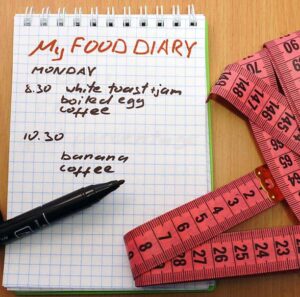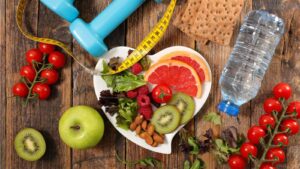
10 Easy Tips to Create a Healthy Weight Loss Diet Plan
Healthy Weight Loss Diet Plan Losing weight can be a challenging journey, but the benefits of a healthy weight-loss diet plan are worth it. A healthy weight loss diet plan is not about depriving yourself of your favourite foods or drastically reducing your calorie intake. Instead, it’s about making small, sustainable changes to your eating habits that you can stick to in the long term. Here are 10 easy tips to help you create a healthy weight-loss diet plan.
1. Eat a balanced diet

- Eat a balanced diet: Make sure to include a variety of foods from all the food groups such as fruits, vegetables, whole grains, lean proteins, and healthy fats in your meals.
- Control your portions: Use smaller plates and bowls, and measure your food to help you eat the right amount.
- Limit your intake of processed foods: Processed foods are often high in calories, unhealthy fats, and added sugars.
- Drink plenty of water: Drinking water can help you feel full and stay hydrated.
- Avoid sugary drinks: Beverages such as soda, sports drinks, and energy drinks are often high in calories and added sugars.
- Choose healthy snacks: Snack on fruits, vegetables, nuts, and seeds instead of high-calorie, high-sugar snacks.
- Cook at home: Cooking at home allows you to control the ingredients and portion sizes of your meals.
- Be mindful of your eating habits: Pay attention to your hunger and fullness cues, and avoid eating when you are bored or stressed.
- Get enough sleep: Lack of sleep can disrupt your hormones and increase your appetite.
- Stay physically active: Regular exercise can help you burn calories and maintain muscle mass, which can help you lose weight and keep it off.
2. Cut back on processed foods

- Cut back on processed foods: Processed foods are often high in calories, unhealthy fats, and added sugars, which can lead to weight gain. Opt for whole foods instead, such as fruits, vegetables, lean proteins, and whole grains.
- Increase your protein intake: Protein is an essential nutrient that helps build and repair muscle, which can help you burn more calories. Aim for lean protein sources like chicken, fish, tofu, and beans.
- Choose healthy fats: Not all fats are bad for you. Choose healthy fats like avocados, nuts, and olive oil, which can help keep you full and satisfied.
- Reduce your carb intake: Carbs are an important source of energy, but eating too many can lead to weight gain. Focus on complex carbs like whole grains, fruits, and vegetables, and limit simple carbs like sugary snacks and processed foods.
- Drink plenty of water: Drinking water can help you feel full and satisfied, which can reduce your overall calorie intake.
- Eat more fibre: Fiber is important for digestion and can help you feel full. Choose high-fibre foods like fruits, vegetables, and whole grains.
- Don’t skip meals: Skipping meals can lead to overeating later on. Instead, aim for three balanced meals and two small snacks each day.
- Plan: Planning your meals and snacks can help you make healthier choices and avoid temptation.
- Practice portion control: Eating too much, even healthy foods, can lead to weight gain. Use measuring cups and a food scale to ensure proper portion sizes.
- Get moving: Exercise is important for weight loss and overall health. Aim for at least 30 minutes of moderate exercise each day, such as brisk walking or cycling.
3. Control your portion sizes

- Use smaller plates: This can help trick your mind into thinking you’re eating more than you are.
- Measure your food: Use measuring cups or a food scale to ensure you’re eating the correct portion sizes.
- Eat slowly: This can help you feel full quicker and prevent overeating.
- Don’t eat in front of the TV or computer: This can lead to mindless eating and overconsumption.
- Don’t skip meals: Skipping meals can lead to overeating later in the day.
- Plan your meals and snacks: This can help prevent impulsive food choices and overeating.
- Use the “plate method”: Fill half of your plate with non-starchy vegetables, one-quarter with lean protein, and one-quarter with whole grains.
- Avoid eating straight from the package: Portion out a serving size and put the rest away.
- Be mindful of liquid calories: Beverages like soda and juice can be high in calories and sugar. Opt for water or unsweetened beverages instead.
- Practice moderation: You don’t have to completely cut out your favourite foods, but be mindful of portion sizes and frequency of consumption.
4. Keep a food diary

- Use a food diary app or write it down on paper: This can help you keep track of everything you eat and drink throughout the day.
- Be honest with yourself: Don’t leave anything out, even if it’s an unhealthy snack or treat.
- Include portion sizes: Write down how much you ate and use measuring cups or a food scale to ensure accuracy.
- Review your diary regularly: This can help you identify patterns in your eating habits and make adjustments as needed.
- Track your water intake: Staying hydrated is important for overall health and can also help with weight loss.
- Use your food diary to plan meals: This can help you make healthier choices and stick to a balanced diet.
- Don’t judge yourself: Remember that the purpose of the food diary is to help you become more aware of your habits, not to criticize or punish yourself.
- Consider sharing your diary with a friend or professional: This can provide accountability and support.
- Be consistent: Try to write down everything you eat and drink, even on weekends or during special events.
- Celebrate your successes: Use your food diary to track progress and celebrate small victories along the way.
5. Stay hydrated

- Drink water regularly throughout the day: Aim for at least 8 cups (64 ounces) of water per day.
- Carry a reusable water bottle: This can make it easier to stay hydrated on the go.
- Flavour your water with fruits or herbs: Try adding slices of lemon, lime, cucumber, or mint to your water for a refreshing taste.
- Drink water before meals: This can help you feel fuller and prevent overeating.
- Avoid sugary drinks: Beverages like soda, juice, and sweetened tea can be high in calories and sugar.
- Limit alcohol consumption: Alcohol can dehydrate you and also add empty calories to your diet.
- Monitor your urine colour: If your urine is dark yellow, it may be a sign that you’re dehydrated and need to drink more water.
- Eat foods high in water content: Fruits and vegetables like watermelon, cucumber, and lettuce can help contribute to your overall hydration.
- Use a hydration app or reminder: These can help remind you to drink water throughout the day.
- Listen to your body: Thirst is a signal that your body needs water, so make sure to drink water when you feel thirsty.
6. Plan your meals

- Track your diet goals.
- Choose meals that include a variety of foods: Make sure to include fruits, vegetables, whole grains, lean protein, and healthy fats.
- Use a meal planning app or worksheet: This can help you keep track of your meals and make adjustments as needed.
- Consider batch cooking: Cook large quantities of meals and freeze them for later use.
- Prepare healthy snacks in advance: This can help prevent impulsive snacking on unhealthy foods.
- Shop for groceries with a list: This can help you stay focused and avoid purchasing unhealthy foods.
- Don’t shop when you’re hungry: This can lead to impulsive purchases of unhealthy snacks and treats.
- Incorporate leftovers into your meal plan: This can help reduce food waste and save time in the kitchen.
- Consider the nutritional value of your meals: Make sure you’re getting the right balance of macronutrients (carbohydrates, protein, and fat) and micronutrients (vitamins and minerals).
- Allow for flexibility: Don’t feel like you have to follow your meal plan exactly. Allow for some wiggle room and make adjustments as needed.
7. Eat protein at every meal

- Choose lean sources of protein: Examples include chicken, turkey, fish, tofu, beans, and legumes.
- Aim for 20-30 grams of protein per meal: This can help keep you feeling full and satisfied.
- Include protein-rich snacks: Examples include Greek yoghurt, cottage cheese, and nuts.
- Make sure to balance protein with carbohydrates and healthy fats: A balanced meal should include all three macronutrients.
- Eat breakfast with protein: Starting your day with a protein-rich breakfast can help prevent overeating later in the day.
- Use protein powders or bars as a supplement: These can be a convenient and easy way to get extra protein in your diet.
- Incorporate protein into your post-workout meals: Consuming protein after exercise can help support muscle recovery and growth.
- Be mindful of portion sizes: Consuming too much protein can lead to excess calorie intake.
- Experiment with different protein sources: Don’t be afraid to try new types of protein to keep your meals interesting and varied.
- Consider consulting with a registered dietitian: They can provide personalized recommendations for your individual protein needs.
8. Snack wisely

- Choose whole foods as snacks: Examples include fruits, vegetables, nuts, and seeds.
- Avoid processed snacks: These are often high in calories, unhealthy fats, and added sugars.
- Portion out your snacks: This can help prevent overeating and mindless snacking.
- Choose snacks that are high in fibre: These can help keep you feeling full and satisfied.
- Include protein in your snacks: This can also help keep you feeling full and satisfied.
- Plan your snacks: This can help prevent impulsive snacking on unhealthy foods.
- Avoid snacking late at night: Late-night snacking can lead to excess calorie intake and disrupted sleep.
- Be mindful of liquid calories: Beverages like soda, juice, and sweetened coffee can be high in calories and sugar.
- Choose snacks that you enjoy: This can help prevent feelings of deprivation and promote sustainable healthy eating habits.
- Consider snacking as a way to fuel your body: Snacks can provide important nutrients to keep you energized throughout the day.
9. Don’t skip meals
- Eat breakfast: Starting your day with a balanced breakfast can help kickstart your metabolism and prevent overeating later in the day.
- Set a regular meal schedule: Eating meals at consistent times can help regulate your hunger and prevent overeating.
- Pack healthy snacks to bring with you: This can help prevent skipping meals when you’re on the go.
- Listen to your hunger cues: Don’t ignore feelings of hunger, as this can lead to overeating later.
- Make sure to eat enough calories: Severely restricting calories can lead to nutrient deficiencies and decreased metabolism.
- Prioritize nutrient-dense foods: Choose foods that are high in vitamins, minerals, and other important nutrients.
- Don’t rely on convenience foods: Pre-packaged meals and fast food can be high in calories and unhealthy fats.
- Plan for busy days: Make sure to have healthy meals and snacks prepared in advance so you don’t have to skip meals.
- Incorporate balanced meals and snacks: Each meal and snack should include a balance of carbohydrates, protein, and healthy fats.
- Consider seeking support from a registered dietitian: They can provide personalized guidance on how to structure your meals and snacks for optimal health and weight loss.
10. Seek support
- Consider working with a registered dietitian: They can provide personalized guidance on how to structure your diet for weight loss and optimal health.
- Join a weight loss support group: This can provide accountability and motivation, as well as a sense of community.
- Enlist a friend or family member to join you: Having a support system can make weight loss feel more achievable and enjoyable.
- Celebrate your successes: Recognizing your progress and accomplishments can help keep you motivated.
- Don’t be too hard on yourself: Weight loss is a journey with ups and downs, and it’s important to be kind to yourself along the way.
- Consider talking to a therapist: Emotional and mental health can play a role in weight loss, and therapy can provide tools to help manage stress and emotions.
- Use social media for inspiration and support: Follow accounts that promote healthy living and weight loss, and engage with others for accountability and encouragement.
- Don’t be afraid to ask for help: Whether it’s meal prep, exercise, or emotional support, reaching out to others for help can make weight loss feel less overwhelming.
- Seek out reputable sources of information: There’s a lot of misinformation about weight loss out there, so make sure to get advice from credible sources like registered dietitians and medical professionals.
- Remember that weight loss is a journey, not a destination: Focus on creating healthy habits that you can sustain for the long term, rather than short-term fixes or quick results.



